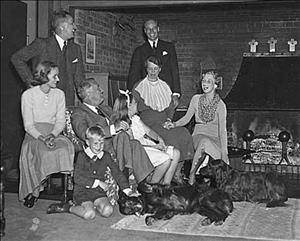Mary Lou Hanify was a teenager in 1937, when President Franklin D. Roosevelt visited Port Angeles to look at the wilderness area proposed for Olympic National Park. More than 30 years later, Hanify wrote about FDR’s historic visit for The Seattle Times Sunday magazine. In 1994, she revised her story for the book Sturdy Folk, edited by Mavis Amundson and published by Western Gull Publishing, a division of the Peninsula Daily News in Port Angeles, Washington. Portions were published on July 14, 1968, in The Seattle Times Magazine. This memoir is reprinted from the book with kind permission.
Roosevelt Comes to Port Angeles
I was one of the school children who crowded the Clallam County Courthouse lawn on Lincoln Street in Port Angeles when President Franklin Roosevelt came to town.
The date was September 30, 1937, and excitement was rampant, not only because the president was interested in establishing a national park in the Olympic Mountains, but also because we got a day off from school.
Preparations had been going on for months, and then the trip was almost canceled because of stormy weather. After hours of waiting, the president and his party came across the Strait of Juan de Fuca from Victoria on the destroyer USS Phelps, and as the ship could be seen rounding the Ediz Hook spit, a 21-gun salute was fired from the U.S. Coast Guard Cutter Samuel D. Ingham, which was stationed in Port Angeles at that time.
Local dignitaries assumed their positions at the pier to welcome the president, who was accompanied by his daughter, Anna Roosevelt Boettiger of Seattle, and her family. Then began a parade with Mr. Roosevelt in the lead in a big yellow Seattle police car, driven by state Patrolman Otto Cameron.
The caravan passed slowly up Lincoln Street, stopping now and then before the awed crowd, whose facial expressions ranged from reverence and adoration to tears. Babies and toddlers were held aloft for the president to see. Most people felt sure that they had been individually singled out for the famous Roosevelt smile. (Heroes were big in those days before television, when we weren’t used to seeing famous names in real life.)
Excitement rippled through the crowd as the cars moved slowly toward the courthouse, where thousands of school children, dismissed early, had gathered on the courthouse lawn.
A banner hung across the courthouse saying: “Mr. President, we children need your help. Give us our Olympic National Park.”
The Roosevelt High School band burst into spine-tingling strains of “The Star Spangled Banner” as the courthouse clock chimed the hour of 6 p.m. Port Angeles Mayor Ralph Davis introduced the president to the people.
A hush fell upon the crowd when the president responded. This was the same magic voice that had charmed millions through numerous fireside chats.
“Mr. Mayor and my friends of Port Angeles,” the president said, “That sign is the appealingest appeal I have ever seen in my travels. I am inclined to think it counts more to have the children want that park than all the rest of us put together.
“So, you boys and girls, I think you can count on my help in getting that national park, not only because we need it for us old people and you young people, but for a whole lot of young people who are going to come along in the next hundred years of America.”
Roosevelt smiled and waved as the caravan moved along on its journey toward Lake Crescent.
The dinner menu at Lake Crescent Tavern (now Lake Crescent Lodge) was regional: Olympic Blackberry Jam, Olympia Oyster Cocktails, Dungeness Crab, Young Puget Sound Turkey, Prime Rib of Washington Beef, Grays Harbor Cranberry Sherbet and Olympic Blueberry or Wild Blackberry Pie.
The presidential party left Lake Crescent the next morning at 9:15 after a breakfast of Washington apple juice, Washington peaches and cream, Sequim ham and Lake Crescent trout. The trout had been caught by Port Angeles schoolboy Willis Welsh and two friends, for whom the state Department of Game opened a closed stream, Barnes Creek, by special permission.
The visitors passed under a huge American flag as they drove away from Lake Crescent. The excitement continued as people from communities west of the Olympic mountains greeted the president with unique demonstrations representative of their area.
This included the topping of a huge Douglas fir tree by a young Forks logger named Fred Wilson, who was congratulated by the president and his grandchildren.
A simulated forest fire and emergency fire-fighting action were demonstrated at Snider Ranger Station. A pair of towering totem poles was erected by the Indian Service at the northern boundary of the Quinault Indian reservation. Washington Governor Clarence D. Martin joined the presidential party at the Lake Quinault Hotel (now Lake Quinault Lodge), where a salmon lunch was served.
School children of the Taholah Indian Agency flashed large cards, each bearing a letter to spell out “Taholah Indian School.” Two war canoes filled with warriors waited at the bridge, and as the caravan passed by the president, paddles were dipped and the canoes shot forward with great speed.
National Park negotiations continued for the next several months, and the final bill was signed on June 29, 1938.
Olympic National Park was born, and many of us who lived in the area at that time still remember the day the president came to town.

